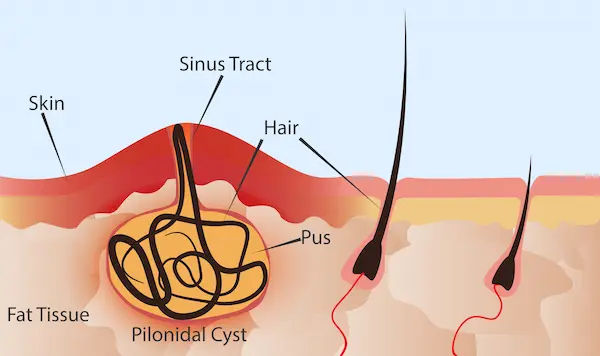Chronic Sinusitis: Signs, Symptoms, and Relief
Struggling with a stuffy nose, facial pressure, and fatigue that won’t go away? Learn the key signs of chronic sinusitis, how it differs from acute sinus infections, and effective treatment options for lasting relief.

Written by Dr. Rohinipriyanka Pondugula
Reviewed by Dr. D Bhanu Prakash MBBS, AFIH, Advanced certificate in critical care medicine, Fellowship in critical care medicine
Last updated on 13th Jan, 2026

Are you constantly battling a stuffy nose, feeling pressure in your face, and dealing with a cough that just won't quit? What feels like a never-ending cold might actually be chronic sinusitis, a common but often misunderstood condition affecting millions. Unlike a typical sinus infection that clears up in a few weeks, chronic sinusitis lingers for months, significantly impacting your quality of life, sleep, and energy levels. This persistent inflammation of the sinus tissues requires a different approach than acute infections. This comprehensive guide will walk you through the key signs of chronic sinusitis, helping you distinguish it from other ailments, explore its potential causes, and understand the pathways to effective treatment and lasting relief. Knowing these symptoms is the first step toward breathing easier again.
What Exactly is Chronic Sinusitis?
Chronic sinusitis is a prolonged inflammatory condition affecting the paranasal sinuses—the air-filled spaces behind your forehead, cheeks, nose, and eyes. It is clinically defined by the persistence of symptoms for 12 weeks or longer, despite attempted treatment. This isn't just a stubborn infection; it's often a complex disorder where the lining of the sinuses becomes chronically swollen and inflamed, disrupting normal mucus drainage and leading to a cycle of discomfort.
Chronic vs. Acute Sinusitis: Knowing the Difference
The key difference lies in duration and cause. Acute sinusitis is often triggered by the common cold or a bacterial infection and typically resolves within 2-4 weeks with or without treatment. Chronic sinusitis, however, is a persistent state of inflammation. While bacterial infections can play a role, it's frequently driven by other factors like nasal polyps, allergies, or an abnormal immune response. Think of acute sinusitis as a short, intense battle, while chronic sinusitis is a long-term siege on your sinus health.
The 10 Most Common Signs of Chronic Sinusitis
Recognising the constellation of symptoms is crucial for identifying chronic sinusitis. The combination and severity can vary from person to person.
The Primary Symptoms You Can't Ignore
These are the hallmark signs that form the core diagnosis of the condition.
Nasal Congestion and Obstruction
This is one of the most common and frustrating symptoms. You’ll experience a constant feeling of blockage in one or both nostrils, making it difficult to breathe through your nose. This is due to the inflamed tissues and thick mucus obstructing the nasal passages.
Thick, Discoloured Postnasal Drip
You may feel a persistent need to clear your throat or have the sensation of mucus dripping down the back of it. The discharge is typically yellow or greenish, indicating inflammation, though it can sometimes be clear.
Facial Pain, Pressure, and Fullness
This is a classic sign. The inflammation and trapped mucus create a dull, aching pressure or tenderness around your eyes, cheeks, nose, and forehead. The pain might worsen when you bend forward.
Reduced Sense of Smell and Taste (Anosmia/Hyposmia)
Inflammation and blockage in the upper nasal passages can prevent odour molecules from reaching the olfactory nerves. This leads to a diminished (hyposmia) or complete loss (anosmia) of your sense of smell, which directly impacts your ability to taste food.
Secondary and Often Overlooked Symptoms
These symptoms result from the primary inflammation and can significantly affect your daily life.
Chronic Sinusitis Headache
The constant pressure and inflammation can trigger a recurring sinus headache. This is often described as a deep, constant throbbing or pressure in the front of the face and head, which is typically worse in the morning due to mucus pooling overnight.
Ear Pressure and Dental Pain
The sinuses are interconnected. Inflammation in the maxillary sinuses (located in your cheeks) can refer pressure to your ears, causing a feeling of fullness or popping, and even to your upper teeth, mimicking a toothache.
Sinusitis Fatigue and Malaise
Your body is constantly fighting inflammation, which is an energy-intensive process. This can lead to profound and persistent sinusitis fatigue, a feeling of general unwellness (malaise), and difficulty concentrating, often mistaken for other health issues.
Chronic Cough and Sore Throat
The relentless postnasal drip irritates the throat lining, triggering a chronic cough (often worse at night) and a persistent, raw sore throat that doesn’t respond to typical cold remedies.
Bad Breath (Halitosis)
The stagnant mucus in the sinuses and nasal passages can become a breeding ground for bacteria, which can produce unpleasant odours, leading to bad breath that brushing and mouthwash can't easily resolve.
What Causes Chronic Sinusitis to Develop?
Chronic sinusitis rarely has a single cause. It usually develops due to a perfect storm of factors that lead to ongoing inflammation and blockage. Common triggers and underlying conditions include:
- Nasal Polyps: These are soft, noncancerous growths that can block the nasal passages or sinuses.
- Deviated Nasal Septum: A crooked septum can restrict sinus passages.
- Allergies (Allergic Rhinitis): Inflammation triggered by allergies is a major contributor.
- Respiratory Tract Infections: Infections, especially recurrent ones, can thicken sinus membranes.
- Immune System Disorders: Conditions that affect the immune system can lead to inflammation.
- Other Medical Conditions: Complications of cystic fibrosis, gastroesophageal reflux (GERD), and asthma are often linked.
How is Chronic Sinusitis Diagnosed?
If you suspect you have chronic sinusitis, a doctor will make a diagnosis based on your symptoms and a physical examination. They will look for signs of inflammation, nasal polyps, or a deviated septum. This may involve using a nasal endoscope—a thin, flexible tube with a light—to see inside your sinuses. In some cases, imaging tests like a CT scan may be ordered to get a detailed view of your sinus areas and identify any deep blockages or structural issues. If your condition is complex or doesn't respond to initial treatment, an ENT specialist can provide a definitive diagnosis.
- Finding Relief: Treatment Options for Chronic Sinusitis
- The goal of treatment is to reduce sinus inflammation, keep nasal passages draining, eliminate any underlying cause, and prevent recurrence.
Medical Treatments and Procedures
A doctor may prescribe treatments such as:
- Nasal Corticosteroids: Sprays like fluticasone or mometasone to prevent and treat inflammation.
- Saline Nasal Irrigation: Using a neti pot or squeeze bottle to flush out thickened mucus and irritants.
- Oral Corticosteroids: For severe inflammation, often caused by significant nasal polyps.
- Biologics: Newer injectable medications that target specific immune pathways for severe cases.
- Endoscopic Sinus Surgery: For cases that don't respond to medication, surgery can enlarge sinus openings and remove polyps or blockages.
Effective Home Remedies and Lifestyle Changes
- Stay Hydrated: Drinking plenty of water helps thin mucus.
- Use a Humidifier: Adding moisture to the air can soothe irritated sinuses.
- Apply Warm Compresses: Placing a warm cloth on your face can ease facial pain.
- Avoid Triggers: If you have allergies, minimise exposure to allergens like dust, pollen, and pet dander.
When to See a Doctor: Don't Ignore the Signs
It's important to consult a healthcare professional if your symptoms last longer than 10 days, keep returning, or are severe. If you have experienced signs of chronic sinusitis—such as nasal obstruction, facial pressure, and discoloured drainage—for more than 12 weeks, it's time to seek expert evaluation. If your condition does not improve after trying these methods, book a physical visit to a doctor with Apollo24|7 for a thorough examination and a personalised treatment plan. Early and accurate intervention is key to managing this condition effectively.
Conclusion
Living with the constant symptoms of chronic sinusitis can be draining, both physically and emotionally. The persistent congestion, facial pain, and fatigue are more than just an inconvenience; they are signs of an ongoing inflammatory condition that deserves proper medical attention. By understanding the key signs and symptoms, you are empowered to take the next step. Remember, effective management is possible. From simple saline rinses and steroid sprays to more advanced treatments, a range of options can provide significant relief and help you reclaim your quality of life. Don’t resign yourself to a perpetually stuffy nose. If this article resonates with your experience, take it as a sign to prioritise your health and seek professional guidance to finally breathe freely again.
Consult a Specialist for the best advice
Consult a Specialist for the best advice

Dr. Rajib Ghose
General Physician/ Internal Medicine Specialist
25 Years • MBBS
East Midnapore
VIVEKANANDA SEBA SADAN, East Midnapore

Dr. Mohammed Kamran
General Practitioner
5 Years • MBBS, FIDM
Nashik
Apollo 24|7 Clinic - Maharashtra, Nashik

Dr. Rohinipriyanka Reddy
General Practitioner
9 Years • MBBS
Hyderabad
Apollo 24|7 Clinic, Hyderabad

Dr. Dhankecha Mayank
General Practitioner
6 Years • MBBS
Hyderabad
Apollo 24|7 Clinic - Telangana, Hyderabad

Dr. B Sivananda Reddy
General Physician
12 Years • D M ( OSMANIA MEDICAL COLLEGE, KNRUHS ) MD ( KASTURBA MEDICAL COLLEGE , MAHE) MBBS ( PESIMS&R, NTRUHS).
Secunderabad
Apollo Hospitals Secunderabad, Secunderabad
More articles from sinus disease
Frequently Asked Questions
Can chronic sinusitis go away on its own?
No, by definition, chronic sinusitis is a long-term condition that persists for over 12 weeks. It typically requires medical intervention to manage the underlying inflammation and does not resolve on its own like an acute sinus infection might.
What is the best way to drain my sinuses naturally?
Saline nasal irrigation using a neti pot or squeeze bottle is one of the most effective and natural ways to drain sinuses. It helps flush out mucus, allergens, and irritants from the nasal passages. Steam inhalation from a hot shower or a bowl of hot water can also provide temporary relief.
Are there any specific tests for diagnosing chronic sinusitis?
While diagnosis is often based on symptoms and a physical exam, a doctor may use a nasal endoscope to look inside your sinuses. A CT scan of the sinuses is the gold standard imaging test to confirm inflammation, view the anatomy, and identify any dee,blockages or nasal polyps.
Can allergies cause chronic sinusitis?
Yes, allergies (allergic rhinitis) are a major contributing factor. The constant inflammation and swelling caused by an allergic reaction can block the sinus openings and prevent proper drainage, creating an environment ripe for developing chronic sinusitis.
When should I consider surgery for chronic sinusitis?
Surgery, typically endoscopic sinus surgery, is considered when symptoms persist despite aggressive medical treatment (e.g., nasal steroids, irrigation, antibiotics if needed). It is also an option if there are structural blockages like a severely deviated septum or large nasal polyps that medication cannot alleviate.

